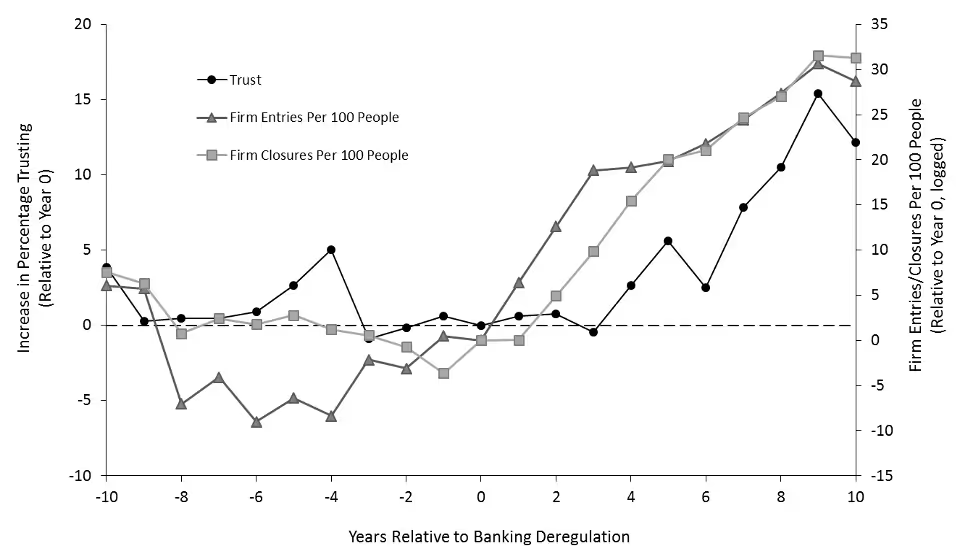Spurred by the arrival of phone banking, new credit-scoring systems, and ATMs, U.S. states began to deregulate their banking sectors in the 1960s and 1970s. Prior to this, each new bank had to obtain a charter from its home state. These charters constrained the growth of banks, suppressed the opening of new branches, prevented banks from crossing state lines, and generally limited competition among banks. The new regulations—the ‘deregulations’—ended local banking monopolies, reduced inefficiencies, and substantially increased the availability of loans to firms. This credit fueled the creation of new companies and thereby intensified the competition across the economy, from construction and services to manufacturing and technology.
How might this policy change, which increased competition in the economy, have shaped people’s psychology and social inclinations? Some might guess that competition will always favor cut-throat self-interest. However, research on cooperation in the field of cultural evolution suggests that, under some conditions, competition among groups (firms in this case) can generate greater cooperation. The idea here is that under increased competition, firms that were better at motivating employees to work more cooperatively and efficiently would have stood a better chance of surviving, prospering and then being copied by other firms. To the degree that the practices, policies, organizational structures, attitudes and managerial approaches of the more successful firms could be imitated (and potentially improved upon), firms across the economy would have—on average—gradually evolved to become more cooperative. As more people spend much of their day in more cooperative environments, governed by impartial norms, they should become generally more cooperative and trusting with anonymous others, even outside of work.
To test this idea, the economists Patrick Francois, Thomas Fujiwara, and Tanguy van Ypersele assembled a database with three key variables. First, they obtained data on the year when each U.S. state deregulated its banking sector. Second, to assess the intensity of inter-firm competition, they gathered data on both the entry of new firms and the closure of older firms. Greater competition should be marked by the entry of more new firms—fresh competitors—and the deaths of older, unsuccessful firms. These two measures permit us to confirm whether the banking de-regulations did indeed increase competition. Third, to measure trust, they compiled data on responses to the famous Trust Question, which asks “Generally speaking, would you say that most people can be trusted or that you can’t be too careful in dealing with people?,” from every state between 1973-1994. Crucially, states deregulated in different years for idiosyncratic reasons usually rooted in local politics, so we have a natural experiment here in which different states are “dosed” with rising competition at quasi-random times. This should allow us to cautiously infer that greater intergroup competition causes any downstream effects on trust.
The results are striking. Almost immediately after deregulation, the competition among firms begins increasing. This is followed, seemingly in lockstep, by trust levels stepping on the up escalator. After about a decade, trust levels are over 12 percentile points higher, on average, in the states that deregulated. So, if 50% of people in a state thought ‘most people could be trusted’ in the year of deregulation, then after about a decade, 62% or more thought so.

Of course, we should worry that the effect of banking deregulation on trust might be peculiar to the United States or to the era when most deregulations occurred, the 1980s and 1990s. To address this, Francois’s team analyzed data from Germany that tracked people from 2003 to 2013, a period that includes the 2008 economic crash. These data allowed them to track the trust of the same individuals as they changed jobs, sometimes moving from one sector or industry of the economy to another. Using data on the competitiveness of 50 different German industries, Francois’s team asked a simple question: what happens to a person’s trust when they move from an industry with weaker competition to one with stronger competition? Remember, we are following the same individuals through time.
The results show that when a person moves into a more competitive industry their trust tends to increase. Specifically, if someone moves from an industry in which three firms divide up the market into one in which four firms divide it up, they will be about 4 percentile points more likely to say ‘most people can be trusted.’ But, if they move into a less competitive industry, their trust goes down (on average). If they don’t move industries or move into a similarly competitive industry, their trust remains about the same. Here, just as in the U.S., the experience of greater inter-firm competition increases people’s trust in strangers.
These findings are further confirmed by a substantial body of research in the laboratories of psychologists and economists. Adding an element of intergroup competition increases people’s willingness to contribute money to collaborative projects—greater cooperation—even when interactions are anonymous and occur only once. These laboratory studies have also confirmed that people’s trust, as measured by the Trust Question, goes up after experiencing the greater cooperativeness fostered by intergroup competition.
This line of research suggests that intergroup competition, which is embedded in many of our modern social, economic and political structures, may provide an unappreciated social dynamic that helps create or sustain high levels of impersonal prosociality—trust, fairness, honesty, and cooperation with strangers. Intergroup competition pervades many modern societies: political parties, sports teams, cities, churches, and universities are all voluntary associations that compete with their peer organizations for members. Properly yoked, intergroup competition can generate greater trust and cooperation, thereby fueling innovation, economic growth, social justice movements, and government effectiveness.
Joseph Henrich is a Professor and Chair of the Department of Human Evolutionary Biology at Harvard University. This piece draws on Chapter 10 of Professor Henrich’s latest book, The WEIRDest People in the World: How the West became psychologically peculiar and particularly prosperous (Farrar, Strauss and Giroux, 2020).



